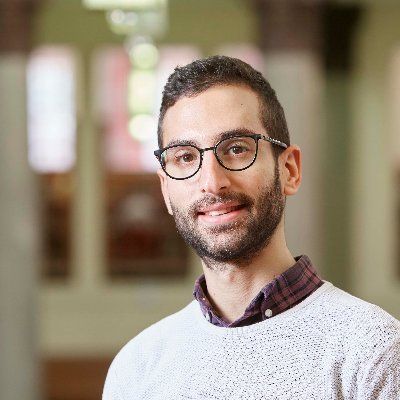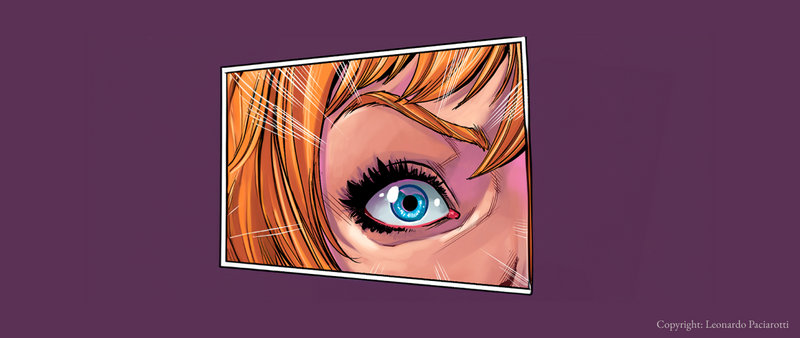My love triangle with English and Italian
One of my earliest memories is sitting on a tourist bus during a family trip in the south of Italy. I was probably five. I remember it was scorching hot and the bus windows were open to allow more air in. Amidst all the sights, sounds and colours around me, my attention focused on a group of tourists who were speaking a foreign language. It sounded so fascinating, and my not understanding a single word of what they were saying only added to the intrigue. So, with a big grin on my face, I started blurting out words in my own made-up language. I was delighted. My mum, on the other hand, looked at me slightly perplexed.
My passion for foreign languages has always been there, for as long as I can remember. It defines me in the same way that my name or my date of birth does. It started out as a game: a mix of curiosity, the satisfaction of ‘cracking the code’ of a different tongue, and just playing with words, sounds and structures to let my creativity flow. It was only years later that I realised the ‘code’ I was really looking for was a different, perhaps more authentic way to express myself, in contrast with the environment I was growing up in.
There was nothing exceptional or particularly traumatic about my childhood in Sicily (Italy), but the truth is, my parents and I never really spoke the same language. As an anxious kid, I would often be misunderstood and labelled as ‘too sensitive’ or ‘too emotional’; I was never given any words to process those big feelings and make sense of them. So, from a very young age, I felt compelled to find my own language. The more complex the ‘code’ was, the more far removed from my parents’ sphere of experience, the better. For example, in middle school, when I was about 11 or 12, I once asked one of my classmates, whose mum was Czech, to teach me some Czech. For about a month or so, she would bring me these lovely little sheets full of verb conjugations and new words to learn, and we would practice a little, and giggle. But mostly giggle. In the end, I never really learnt any Czech.

On the other hand, I had been learning English since the age of 7. I had always loved it and had always showed what you may call a natural ‘talent’ for it. Granted, it wasn’t this super-secret code, obviously. English was then, like it is today, the lingua franca. My parents could (and still can) use and understand a number of phrases; but they didn’t really know the language, and that, I guess, gave me enough reason to make it mine. Several other years went by. My adolescence came and went, and my only contact with English was through formal education, even though I would always try to go a little deeper, by either reading online articles or looking up song lyrics. English was like a silent companion, a promise of ‘otherness’, an escape, a constant reminder of all these wonderful places I could go to. Until I did.
Towards the end of my master’s degree in Psychology, I was selected for an exchange programme which took me to Philadelphia, US. I only stayed there for six months, but it was enough to get me hooked and convince me that I wanted to live in an English-speaking country for the rest of my life. I missed my home, Sicily, my family and friends; and yet, I was exhilarated by the ways in which speaking another language simply unlocked certain aspects of my personality and made me feel more authentic. Once I finished my degree, I decided to change my career path and study English Linguistics in the UK, which is where I still live, 6 years later.
I wasn’t fully aware of it then, but when I first arrived in this country, I was going through a major phase in my life. Change was afoot and undeniable, and English would soon be not just the language of my new lectures and seminars but, most importantly, the language of my heart. Like my time in the US, being away from a familiar environment, away from the expectations of people who have known you your entire life, while being exposed to a different language and worldview, all of that unlocked my innermost feelings and desires, only this time, in a much more powerful way. For the first time in my life, I told myself what I had known to be true for a while: ‘I am gay’. It was the most natural thing. Yet, the Italian version of that (‘Sono gay’) had been unspeakable, and therefore unthinkable. And how could it be any different, when everything and everyone, from family to school, had made me believe that my truth was not to be spoken? The story of my coming out could only be written in English and then translated to Italian, in a clumsy adaptation. All the feelings, the sensations and the memories of that story are forever imprinted in the ‘English part’ of my brain.

As Bakić and Škifić have recently pointed out, defining ‘bilingualism’ is quite complex. There are several different criteria that you can consider, such as linguistic origin (for instance, whether you have spoken two languages from birth) or actual proficiency in a second language, regardless of when you started learning it. Others, like Hamers and Blanc, adopt a broader definition and focus on the psychological experience of being ‘bilingual’, suggesting that it’s different and unique for everyone, the result of several internal and external variables.
I never thought of myself as ‘bilingual’, until very recently. For me, that term was reserved to people who use two languages on a daily basis from a very young age. But over the last few years, English has become so central to my own personal journey that I do feel bilingual, too. However, my experience of it is one dominated by conflict. English is both fun and profound; it makes me feel creative, emotional and light-hearted, all at the same time. Italian, on the other hand, is… Italian. It’s complicated and bittersweet. It can be fun, on a good day; but most of the time, there’s an undercurrent of tension inside of me, when I use it. It’s the type of discomfort that you feel when an old friend has let you down and you don’t know if you can trust them again.
I wish I could say that I have found a solution, but my best answer is: I’m working on it. Sometimes, my mind goes back to that bus, on a hot summer day of many years ago; back to a time when languages were just a fun game for a curious child, long before they were loaded with all these extra meanings.
I have often told myself that the solution is to live ‘in between’: between languages, between cultures, even between identities. Now, I’m starting to realise that I can actually live in all of them, and be all of them. I can be Italian, English, British and Sicilian, choosing any one of them, or all of them, on any given day. All the places I have been to, the dialects and accents I have spoken and forgotten, they all make me who I am. The result? Perhaps an incomprehensible mix, much like the nonsensical language I made up when I was five. But I’m sure it will start to make sense, one day at a time.






